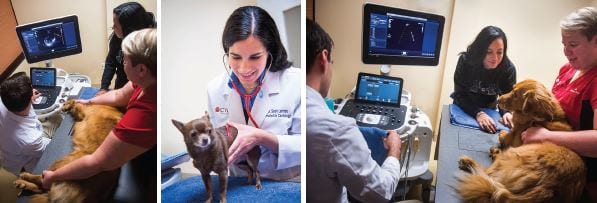Why CT Scans For Animals Are Becoming Standard in Modern Veterinary Medicine}
Wiki Article
Exploring the Crucial Providers Used by a Veterinary Cardiologist: Understanding Ultrasound and CT Check Methods
Vet cardiologists play an important role in the health of pet dogs by identifying and dealing with different heart conditions. They make use of innovative imaging strategies, such as cardiac ultrasound and CT scans, to supply accurate evaluations. Each approach has its distinct benefits and applications. Comprehending these techniques is crucial for family pet owners looking for the very best treatment for their buddies. What variables should family pet owners consider when choosing in between these diagnostic tools?
The Duty of Vet Cardiologists in Family Pet Medical Care
Veterinary cardiologists play an essential duty in the medical care of family pets, concentrating particularly on identifying and treating heart-related conditions. They possess specialized training that enables them to analyze intricate diagnostic tests and recognize different cardiovascular issues. These experts utilize sophisticated techniques, such as echocardiography and electrocardiography, to examine heart function and structure accurately.Veterinary cardiologists likewise establish tailored therapy plans that might consist of drugs, way of living adjustments, and, sometimes, medical treatments. Their proficiency includes enlightening animal proprietors about heart wellness, emphasizing the value of normal exams and very early discovery of potential troubles. Cooperation with basic veterinarians is vital, as it guarantees comprehensive care for pets with suspected heart problems. By offering specialized services, vet cardiologists considerably enhance the lifestyle for pet dogs and offer assurance for their proprietors, reinforcing the relevance of heart wellness in overall pet dog wellness.Usual Heart Issues in Family Pets
Common heart concerns in family pets can greatly impact their health and wellness and quality of life. Heart murmurs, numerous kinds of cardiomyopathy, and congenital heart defects are amongst the most common conditions that vets experience. Board Certified Veterinary Cardiologist. Recognizing these problems is essential for family pet proprietors to guarantee timely medical diagnosis and suitable therapyHeart Murmurs in Pets
Although heart murmurs can be a source of concern for animal proprietors, they are not constantly indicative of significant health problems. A heart whispering is an uncommon noise created by stormy blood flow within the heart. In animals, these murmurs can be brought on by numerous factors, including congenital heart flaws, shutoff issues, or also tension throughout examinations. Numerous family pets with heart whisperings lead typical lives without substantial health impacts. To identify the underlying cause, vet cardiologists typically utilize analysis techniques such as echocardiograms and Doppler ultrasounds. Early detection and analysis are essential, as they may assist handle any type of possible heart concerns efficiently. Pet dog proprietors are encouraged to consult their veterinarian for an extensive assessment if a heart murmur is detected.Cardiomyopathy Kind Explained
Cardiomyopathy includes a team of conditions affecting the heart muscle, causing endangered cardiac feature in pet dogs. One of the most typical types consist of expanded cardiomyopathy (DCM), hypertrophic cardiomyopathy (HCM), and limiting cardiomyopathy (RCM) DCM mainly affects dogs, creating the heart to increase the size of and deteriorate, which decreases its ability to pump blood effectively. In contrast, HCM is more prevalent in cats, identified by the enlarging of the heart walls, often causing obstructed blood flow. RCM, though much less usual, happens when the heart muscle mass ends up being stiff, limiting its capability to loaded with blood. Each type offers distinct obstacles in medical diagnosis and therapy, requiring specialized veterinary cardiological evaluation to guarantee peak monitoring and care for influenced pets.Congenital Heart Defects
Genetic heart flaws represent a considerable group of cardiac problems in pets, distinctive from gotten conditions such as cardiomyopathy - CT Scans For Dogs. These defects are structural abnormalities existing at birth, influencing the heart's normal feature. Common kinds include license ductus arteriosus, ventricular septal defects, and pulmonic constriction. Signs and symptoms may differ widely, varying from mild to extreme, and can include exercise intolerance, coughing, and trouble breathing. Early diagnosis with sophisticated imaging strategies like ultrasound is important for efficient management. Vet cardiologists play a vital function in recognizing these problems and recommending ideal treatment options, which might include clinical administration or medical intervention. Recognizing hereditary heart flaws permits much better outcomes and boosted lifestyle for influenced petsRecognizing Cardiac Ultrasound: Just How It Works
A substantial number of vet practices now use cardiac ultrasound as a crucial diagnostic tool for examining heart wellness in pets. This non-invasive strategy uses high-frequency sound waves to produce photos of the heart's structure and function. Throughout the treatment, a vet professional applies a gel to the pet's upper body and utilizes a transducer to discharge ultrasound waves. These waves jump off the heart and bordering structures, generating real-time images on a monitor.Veterinarians can evaluate different elements of heart health, including chamber dimension, wall surface movement, and valve function. In addition, cardiac ultrasound enables the discovery of problems such as fluid accumulation and hereditary heart problems. This technique is vital for identifying conditions that may not be visible via typical radiographs. By giving detailed information about the heart's makeup and efficiency, heart ultrasound aids in formulating effective treatment prepare for animals experiencing from cardiovascular disease.The Relevance of CT Checks in Detecting Heart Issues
Exactly how do CT scans improve the diagnosis of heart disease in veterinary medication? CT scans provide thorough cross-sectional pictures of the heart and surrounding structures, allowing vets to imagine intricate anatomical partnerships. This imaging method is particularly valuable in determining congenital heart flaws, cardiac tumors, and abnormalities in blood vessels. By using innovative imaging algorithms, CT scans can assess heart chamber sizes and feature, supplying a detailed sight that may be hard to attain with conventional methods.Additionally, CT angiography can envision helpful hints blood circulation and recognize areas of constriction or obstruction, which is necessary for planning possible treatments. The speed and accuracy of CT scans additionally facilitate fast medical diagnoses, important in emergency situation situations. Inevitably, the incorporation of CT scans right into vet cardiology significantly boosts the accuracy of diagnoses, making it possible for targeted therapy plans and boosting individual outcomes for pets experiencing from heart disease.Comparing Ultrasound and CT Check Techniques
While both ultrasound and CT scans are invaluable devices in vet cardiology, they provide distinctive advantages and constraints that influence their use in identifying heart problems. Ultrasound, or echocardiography, provides real-time imaging of the heart's structure and function, enabling veterinarians to examine heart chambers, shutoffs, and blood flow. It is specifically efficient for evaluating conditions like coronary infarction and cardiomyopathy. Nevertheless, ultrasound might be limited in visualizing specific physiological structures due to patient size or obesity.In contrast, CT scans offer comprehensive cross-sectional photos of the heart and surrounding tissues, making them optimal for determining structural irregularities, growths, or vascular concerns. Although CT scans give detailed understandings, they need sedation and might entail radiation direct exposure. Ultimately, the option between ultrasound and CT checks depends upon the details clinical scenario, the patient's condition, and the info required for an exact medical diagnosis.Treatment Options Offered With Veterinary Cardiology
Vet cardiology uses a variety of therapy choices customized to attend to various heart disease in pets. Therapy plans typically start with way of life adjustments, consisting of diet plan changes and workout modifications, targeted at enhancing overall heart wellness. Drugs play an essential duty, with cardiologists recommending drugs such as diuretics, beta-blockers, and ACE preventions to enhance and take care of symptoms heart function.In extra extreme situations, interventional treatments, such as balloon valvuloplasty or stent placement, might be needed to relieve obstructions or boost blood flow. For particular genetic heart defects, medical options might be discovered to deal with structural issues. Furthermore, ongoing monitoring and follow-up care are necessary elements of an extensive treatment strategy, enabling for prompt adjustments based on the animal's action to treatment. Overall, vet cardiology concentrates on supplying effective, customized care to enhance the health and wellness and well-being of pet clients with heart conditions.Just how to Prepare Your Pet for a Cardiac Evaluation
Preparing a pet dog for a heart evaluation is necessary to guarantee exact results and a smooth procedure. Owners should initially set up the appointment with the veterinary cardiologist and talk about any kind of particular needs or issues. It is advisable to keep food for a minimum of 12 hours before the examination, as this assists improve imaging quality throughout treatments like ultrasound or CT scans.Additionally, preserving a calm environment on the day of the visit can assist minimize the pet dog's anxiousness. It find more is useful to bring along any pertinent medical documents, consisting of previous examinations and drugs (Ultrasound For Dogs). Owners must also make specific that their pet dog fits and leashed during transportation to the center. Acquainting themselves with the evaluation procedure can help and minimize concerns in asking educated questions during the assessment. By following these actions, owners can contribute significantly to the effectiveness of the cardiac assessmentOften Asked Concerns
For how long Does a Cardiac Ultrasound or CT Scan Take?
The duration of a cardiac ultrasound commonly ranges from 30 to 60 minutes, while a CT scan might take around 15 to 30 mins. Factors such as the client's problem can affect these time estimates.
Exist Any Risks Related To These Analysis Procedures?

Can I Stick With My Family Pet Throughout the Treatment?
The veterinary Click Here facility's policy usually dictates whether pet dog owners can remain during treatments. While some clinics urge owner presence for convenience, others might call for splitting up to assure security and suitable problems for diagnostic imaging.Just how much Do These Diagnostic Examinations Usually Price?
The prices of analysis tests, such as ultrasound and CT scans, generally differ based on location and facility. Commonly, costs range from a couple of hundred to over a thousand bucks, mirroring the intricacy and technology involved.
What Is the Recuperation Process After a Cardiac Assessment?
The recuperation process after a cardiac evaluation entails monitoring the pet dog for any type of instant responses, making sure convenience, and restricting physical activity. Veterinarians generally supply post-evaluation directions to assist family pet owners throughout this essential healing duration. Heart murmurs, numerous kinds of cardiomyopathy, and congenital heart issues are amongst the most common problems that veterinarians run into. A heart murmur is an unusual sound generated by rough blood circulation within the heart. Cardiomyopathy includes a group of conditions impacting the heart muscle mass, leading to jeopardized cardiac feature in family pets. Genetic heart defects represent a significant category of cardiac issues in pet dogs, unique from obtained conditions such as cardiomyopathy. Ultrasound, or echocardiography, supplies real-time imaging of the heart's structure and feature, allowing veterinarians to analyze heart chambers, valves, and blood flow.Report this wiki page